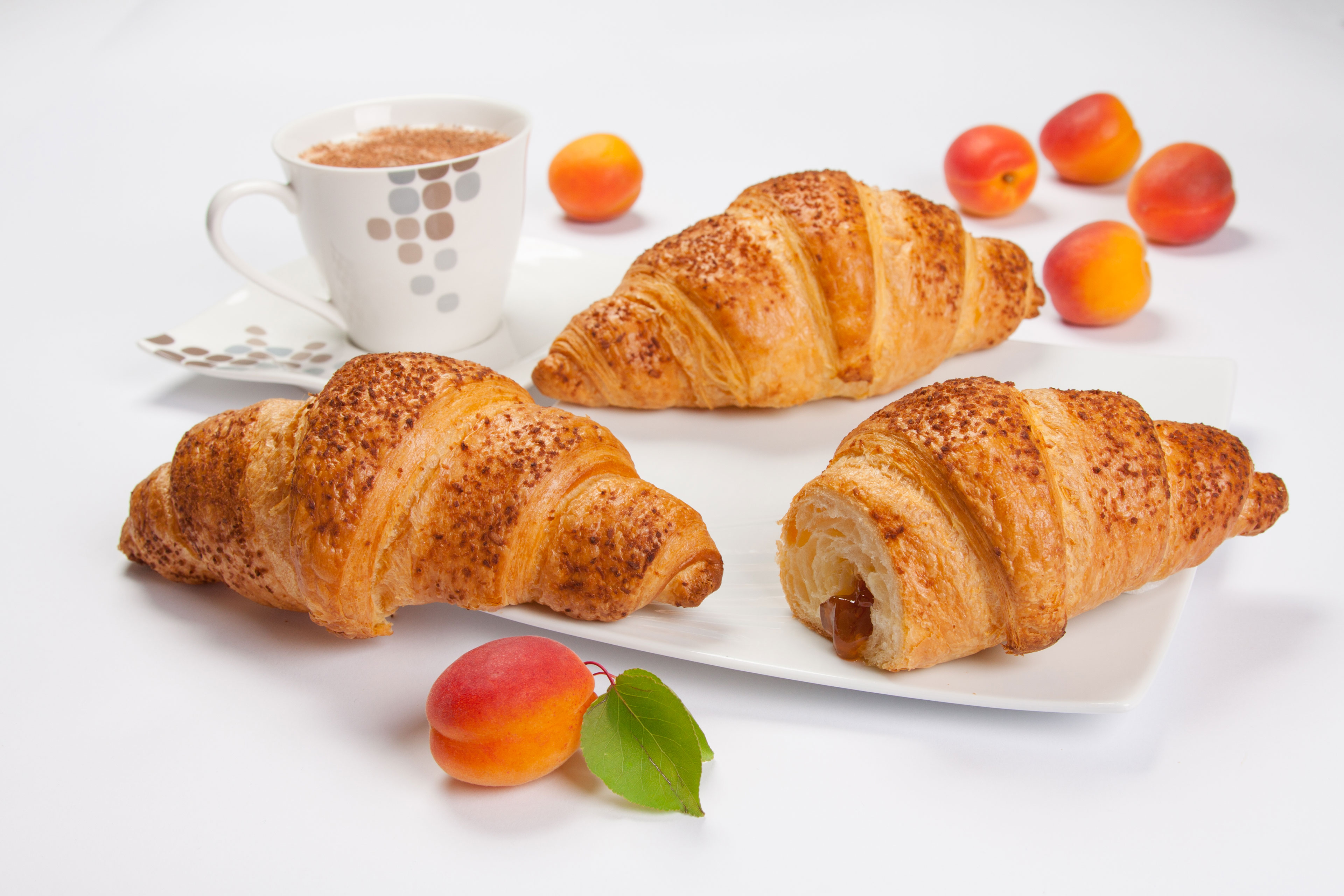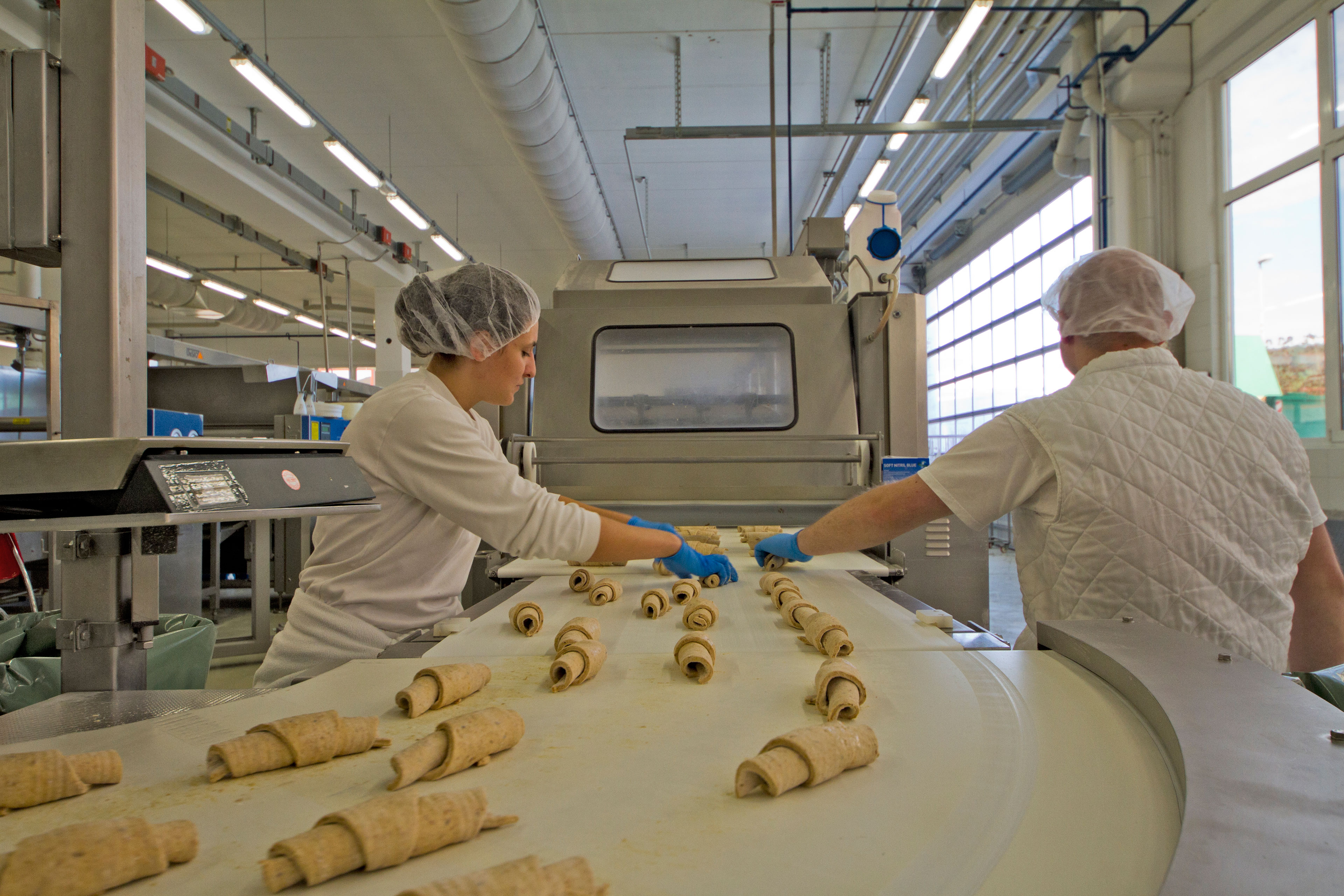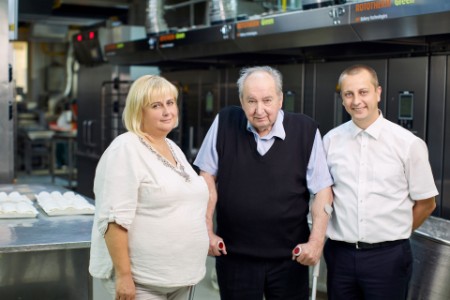I try to teach my daughters responsibility and key moral standards so that they will at least be good owners, if not Directors.
Silvester Pečjak
A school lunch never to be forgotten
Did Stanislav ever imagine that the company would become this large? He confesses that he does not know what he imagined. However, he does know that he was always one of the best bakers and that their highly-automated factory is crucial to their success.
Their flagship product is the croissant. “Silvester once came home from school and said to me: ‘Look, dad, this is what you need to bake, it’s what we eat at school.’” He brought a croissant,” says Stanislav Pečjak smiling. Five workers now make a tonne of them in an hour, although the croissant from 2003 has almost nothing in common with today’s version. Back then, it contained around 30% fat, compared with only 17% today. It also has a different shape and comes in different flavors.
Customers directly influence changes and development and Silvester Pečjak makes it clear that they need to be listened to. Pekarna Pečjak works a great deal with the public sector and also designs custom products for the B2B segment. They buy ingredients from leading world producers and thus have access to quality research and information. Their technologists visit fairs and develop contemporary products, while salesmen test them in the market. Annually, they produce around 300 samples, of which between 5 and 10 reach the store shelves.
Aside from development, one of their key competitive advantages is flexibility, with agility and adaptability becoming increasingly important in the baking industry, according to Silvester.
Silvester insisted years ago on writing the family constitution. He is certain that if the rules are clear, conflicts can be avoided.
They were raised not to treat the company as their property, but rather to work in it and be responsible for its growth and development.
Beginnings among flour sacks
The beginning was not easy. Silvester remembers playing among the sacks of flour and accompanying his father to sell products from store to store, because there were not enough orders. All three of the children came to the bakery in Škofljica to weigh pasta and stack cardboard packaging. When they were older, they always worked at the company during school holidays.
“But I also remember my father’s success with bread,” Stanislav fondly remembers and adds: “We had the best bread in Ljubljana, from a baker who learned his trade in the army. The shopkeepers came looking for it themselves.” At the time, they baked four times more bread than they do today.
When the Yugoslav civil conflict spread to Croatia, they lost 50% of their market in one day. “When you lose such a big market share, you can either close the company or heavily restructure things,” Silvester says. “This is why father quickly took up baking, preparing confectionery and frozen goods. The latter has been growing since 1991 and today represents 85% of our production.”
Baking as a way of life
From the foundation of the first shop, there have been quite some changes. Pekarna Pečjak was always owned by Stanislav Pečjak and his wife, but today, due to transfer of ownership, he is the sole owner. He is proud to have imparted a work ethic to his children. They grew up alongside the company and it is their way of life. All three of them, along with their partners, found a way into the family business. The oldest daughter Majda was employed by the company after finishing secondary school of food technology and has worked in the company for the past 28 years. “I did not consider going anywhere else. I grew up with the company and I am continuously learning,” says Majda honestly. Today, she is the Deputy Director and Manager of Logistics and Sales. Her brother Silvester praises her thus: “In Slovenia, we have 2,500 customers and we are known for our good logistics. She developed the best logistics for frozen products.”
The second daughter Tanja also came to the company two or three years after finishing secondary school of economics. Before leaving to deal with family matters, she was Head of Quality Management.
Silvester, the youngest child, has worked in production since 2003 after finishing his studies in food technology. In 2005, at the age of 26, took over the reins of the company, at that time with 241 employees, as his father’s health suddenly declined. “We knew my brother would be the Director. I am glad that my parents have decided this and I agree with their choice and respect it,” stresses Majda.

“We knew my brother would be the Director. I am glad that my parents have decided this and I agree with their choice and respect it,” stresses Majda.
Third generation: one day I will be the boss
Silvester insisted on writing a family constitution years ago. “I found it important to leave no open questions among us that could lead to disputes. Our parents arranged everything. If the rules are clear, conflicts can be avoided,” he says with confidence. He explains that they were raised not to treat the company as their property, but rather to work in it and be responsible for its growth and development.
Silvester makes it clear that the next generation also shares responsibility for the growth of Pekarna Pečjak, rather than living in luxury. “I have two daughters of nine and three. I try to teach them responsibility and key moral standards so that they are at least good owners, if not Directors.” Stanislav adds that his nine-year-old likes to say: “Once my grandpa was the boss, now my daddy is the boss and one day, I will be the boss.”
What of the other children of the third generation? Majda stresses that it is their path and their choice. “The oldest daughter is doing postgraduate study in a completely unrelated field. I am encouraging her to seek employment in an area where she will be happiest.” The younger two children have only just started secondary school but the door is open to all of them and as she says, a person has to be committed to the company with their heart and soul. According to her, the person’s profile is not as important as their willingness to learn.

Fresh eggs instead of powdered
Even though Stanislav Pečjak is retired and almost 80, he still comes to work every morning at six. He likes his routine, coffee and newspapers, but he is no longer involved in the company’s operations. The company is his fourth child, Majda tells us. She adds that they are autonomous in their work and trust each other, but they also communicate regularly during meetings or even short encounters in the company hallways. They have agreed to notify each other about all investments.
“But it does not all depend on us; there are 400 employees and 400 families. There are several cases where both partners are our employees and this gives us a big responsibility. Both my partner and I also work for the company. If we ‘go belly-up’, we will both be jobless but we try not to think about that. Instead, we think about growth and work towards that,” says Majda Matjaž.
Stanislav Pečjak admits that he did not sufficiently understand the closed nature of the Austrian market and therefore generated €1.8 million in expenses. His subsidiary in Croatia, however, sold 52% more in 2017 than in the previous year. Croatia, Austria and Sweden are their most important foreign markets, while they also export small quantities to Italy, the Czech Republic, Slovakia and the Netherlands. They are distinguished by high-quality ingredients, fantastic taste and reliable service, so their prices are consequently higher. “Our products are made with fresh eggs and not the powdered variety others use because it is just not the same,” Silvester proudly claims.
Summary
Pekarna Pečjak in a nutshell: quality, flexibility, reliability, responsibility, work.


